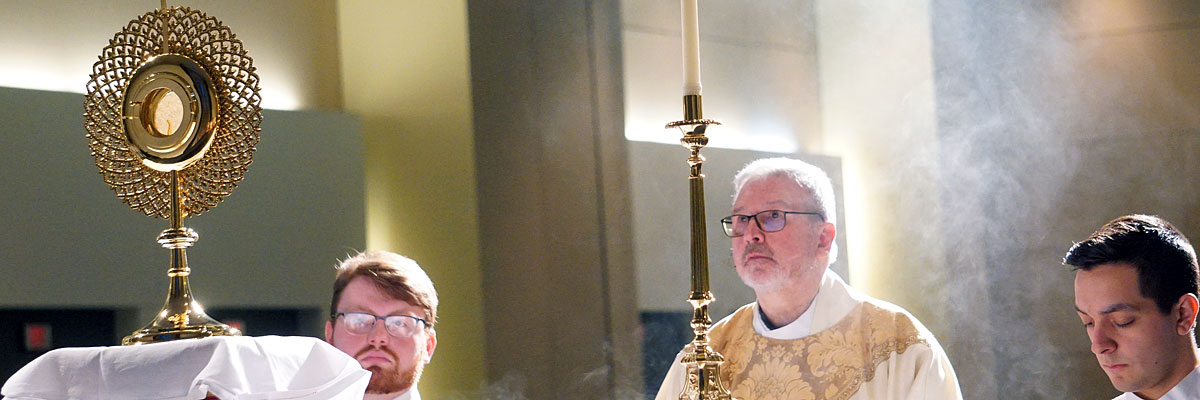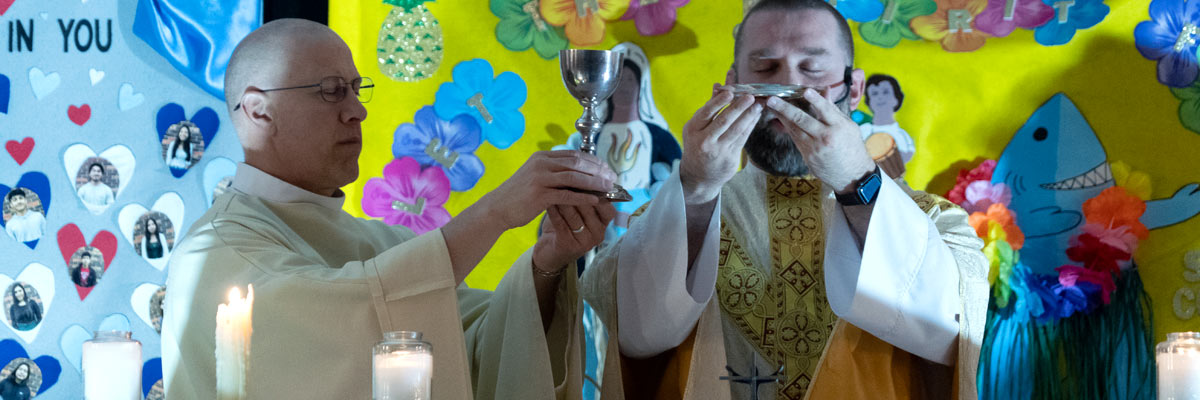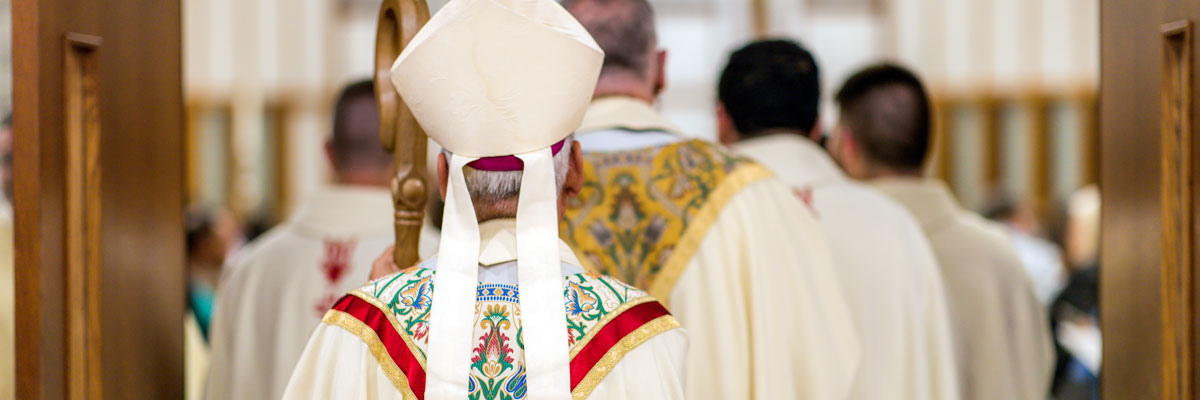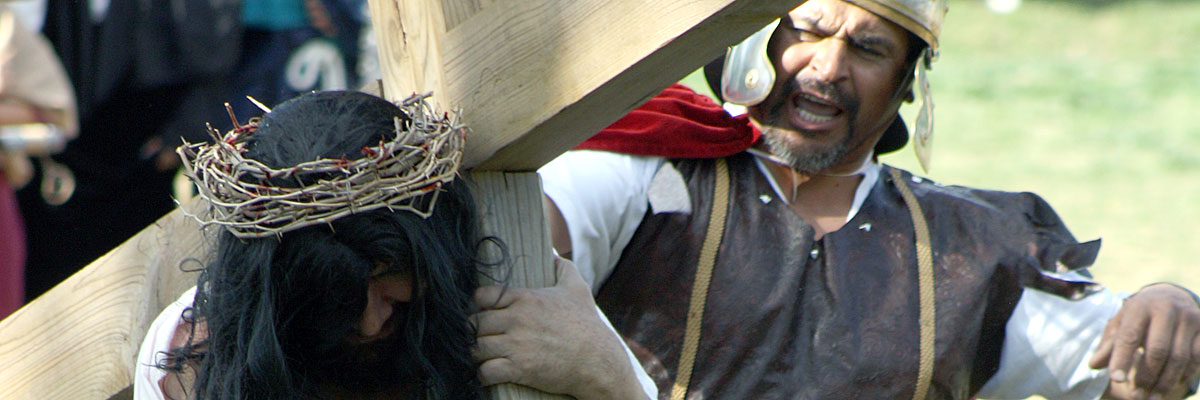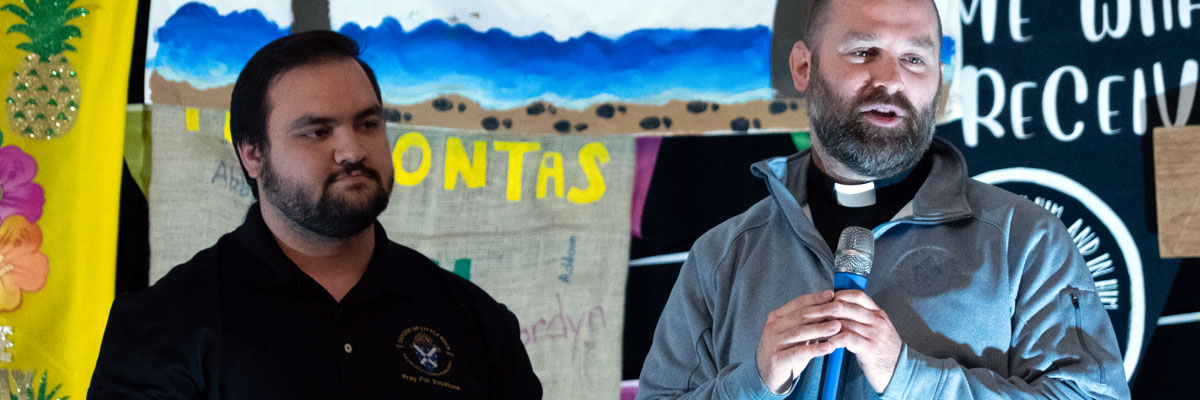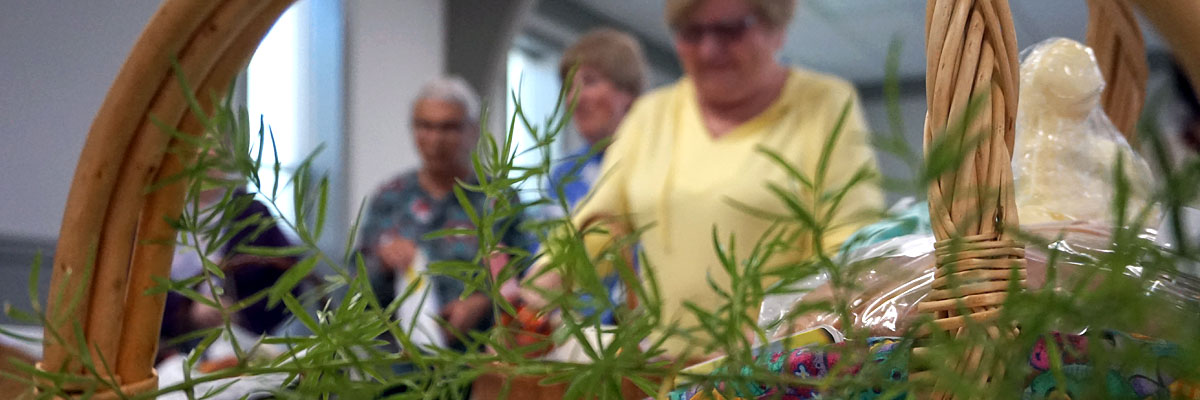Official Website of the
Catholic Diocese of Little Rock
Answers for Mass, Eucharist questions
Published: October 22, 2005
By Father Erik Pohlmeier
The following is a list of questions often asked about the Eucharist and Mass. Father Erik Pohlmeier, chairman of the Year of the Eucharist Committee and theological consultant for Arkansas Catholic, provided the answers. Q. What do Catholics mean by “real presence?” A. In the most blessed sacrament of the Eucharist, the body and blood, together with the soul and divinity, of our Lord Jesus Christ and, therefore, the whole Christ is truly, really, and substantially contained. (“Catechism of the Catholic Church,” 1374) Once the bread and wine used at Mass are consecrated by the priest Christ is truly present. It is not a symbolic presence but the “real presence” of Christ. The appearance of bread and wine remain but the substance has changed. Q. What does the word “Eucharist” mean? A. The word “Eucharist” originated from the Greek word meaning “thanksgiving.” Q. When does the bread and wine become the body and blood of Jesus? A. During the eucharistic prayer of the Mass, at the words of consecration,“ This is my body; This is the cup of my blood.” Q. Why did Jesus choose bread and wine to change into his body and blood? A. In the Old Covenant bread and wine were offered in sacrifice among the first fruits of the earth as a sign of grateful acknowledgment to the Creator. (1333) Bread and wine took on greater significance as part of the exodus meal and the celebration of Passover. At the Last Supper Jesus offered a new covenant in his blood and gave new meaning to the blessing of the bread and the cup. Q. Why does the priest kiss the altar at the beginning of Mass? A. The kissing of the altar, as well as the Gospel, is a sign of veneration. It is a physical expression that draws attention to the altar because of its importance as the place where the sacrifice takes places. The altar itself is made holy by the Eucharist. Q. Who wrote the Eucharistic prayers said at Mass? A. The complete answer to this question would require a treatment of history well beyond the space available here. Suffice it to say the original text is the work of various writers during the early centuries of the Church. The text used in the Mass today has been in place since the seventh century. St. Gregory the Great is credited with its final revision and arrangement. Q. Why is water mixed with the wine at Mass? A. It is an action symbolic of the effect of holy Communion. As a result of holy Communion we are joined to Christ as part of his own body. Our human lives joined to his, both human and divine. The accompanying prayer says it well: “By the mystery of this water and wine may we come to share in the divinity of Christ, who humbled himself to share in our humanity.” Q. As a parent, how do I explain the Eucharist to my children? A. Children seem to understand very easily that the Eucharist is Jesus. Given their capacity for imagination, maybe they don’t have the obstacle to believing that adults do. A child can be captivated by the idea of a miracle, in this case a miracle that happens right there on the altar. Jesus becomes food so that he can come inside of us. The saints speak of Jesus hidden in the Eucharist, that may also help an explanation for children. Q. My children squirm and make noise in church. Why isn’t it OK for me to just bring them to Mass when they are older? A. Attendance at Mass should become a routine for children, something they see as important even when it takes some sacrifice. While they may not be able to focus on an entire ceremony there are parts that can capture their attention. They can learn to associate what goes on at Mass as something from God. It is also important to understand that caring for small children at Mass comes with special graces. God has given these children to their parents and understands that they are often distracting, he will give you his grace without perfect attention. Q. What is a simple explanation for me to give to my non-Catholic spouse as to why Catholics place so much importance on the Eucharist? A. It is because Jesus gives it great importance in the Scriptures. In John chapter 6 Jesus says the bread he gives is his flesh for the life of the world and unless we eat this bread and drink this cup we have no life in us. Then at the Last Supper Jesus gave clear instructions to continue that celebration in memory of him. Q. Why do we bow before we receive the Eucharist now? A. Bowing is a sign of reverence for what we are receiving. Giving the instruction to do so is an effort for uniformity. Communion is also about the communion we share with each other so the uniform act of reverence is a sign of communion. Q. Should a Catholic receive Communion at other Christian churches? Why or why not? A. Catholics should not receive communion at most other churches because communion is a sign of unity of belief. To share communion in worship is to say we actually are in communion. Unfortunately that level of unity does not exist so to share communion would be a false sign for us. Q. Why can’t non-Catholics take Communion at Mass? A. Non-Catholics should not receive the Eucharist for the same reason given for the previous question, as well as the fact that we don’t believe the same things about what communion is. Q. Why are Catholics supposed to dip their hand in holy water, make the sign of the cross and genuflect upon entering a church? A. Such gestures are a sign of reverence upon entering a sacred place. How we treat God’s house should be different than how we treat any other place and gestures remind us of that fact. In addition, such gestures are in themselves prayer. The sign of the cross should be thought of as a kind of minicreed, re-affirming what we profess in full as we say the Nicene Creed. Holy water is a reminder of the grace of baptism as we ask God’s blessing with blessed water. Q. Why are Catholics asked to fast for an hour before receiving Communion? A. Fasting is a way to foster an interior understanding of what is to be received. Abstaining from other food helps the process of preparing to take Jesus into our own bodies. Fasting can also create a hunger that is then fed by the very Body and Blood of Jesus. Q. Why it is necessary to go to confession before receiving Communion at Mass? A. Confession before Communion is only required for those conscious of grave sin. Scripture makes it clear that we should have the right disposition when receiving communion, “Whoever, therefore, eats the bread or drinks the cup of the Lord in an unworthy manner will be guilty of profaning the body and blood of the Lord … For any one who eats and drinks without discerning the body eats and drinks judgment upon himself.” (1 Corinthians 11-22-29) Q.What can I do if I am struggling to accept that the bread and wine is actually the body and blood of Christ? A. Over the course of history many people have struggled with this belief. Even in the Gospel it was hard for the first to hear it (cf. John 6). At times God has worked eucharistic miracles to strengthen faith. The best approach is an open heart before God. As you receive Communion, pray for greater faith. Spend time with Jesus in the Eucharist and ask him to teach you himself.


